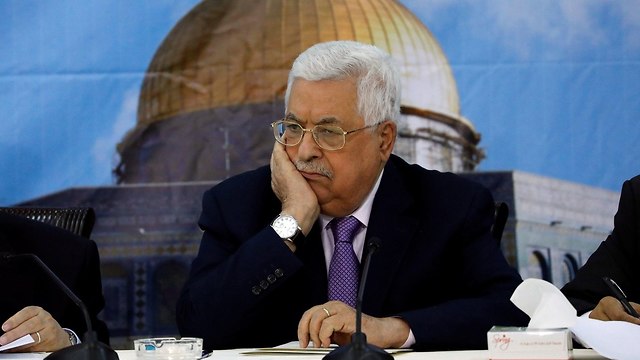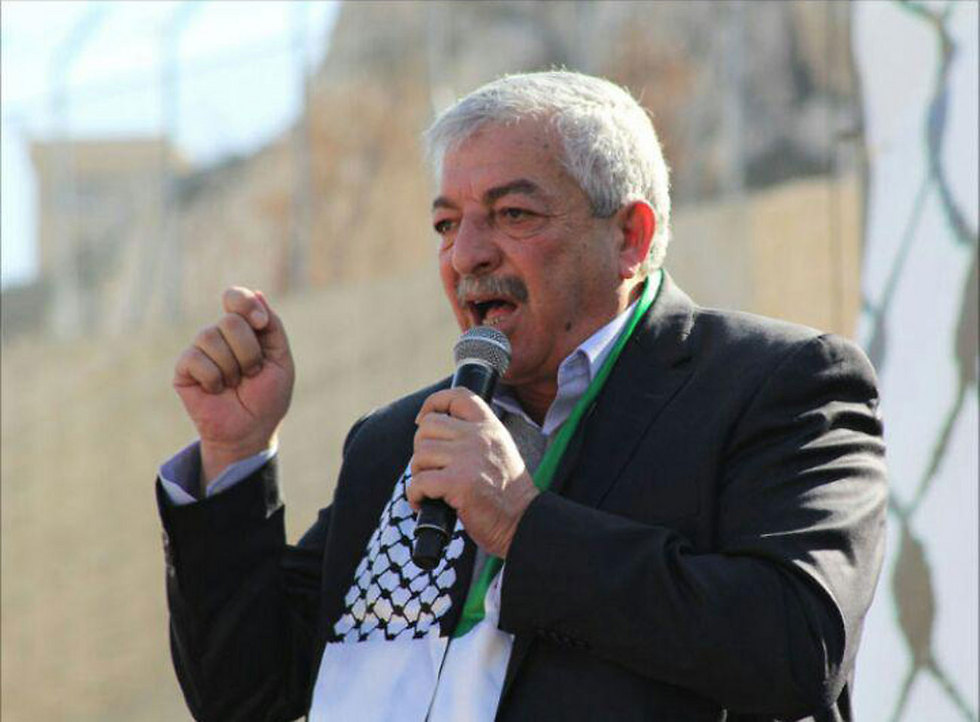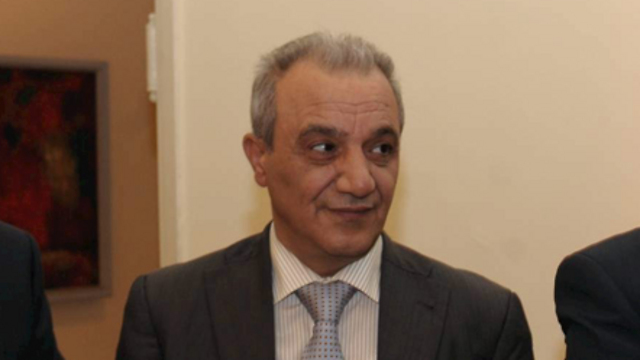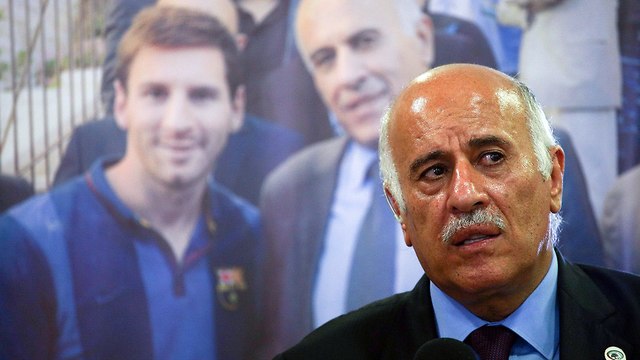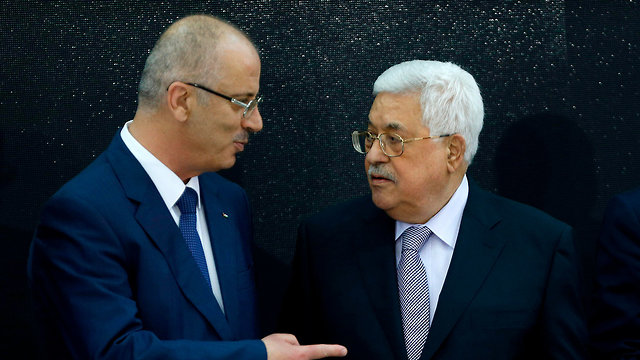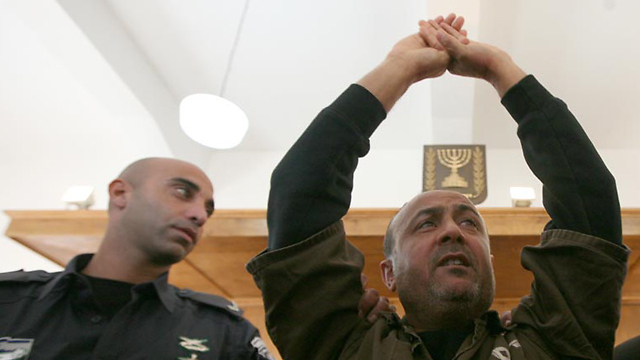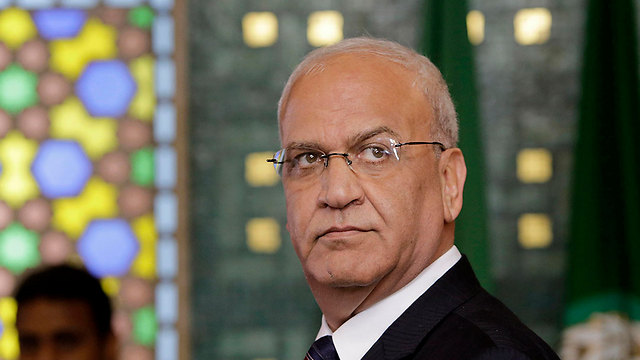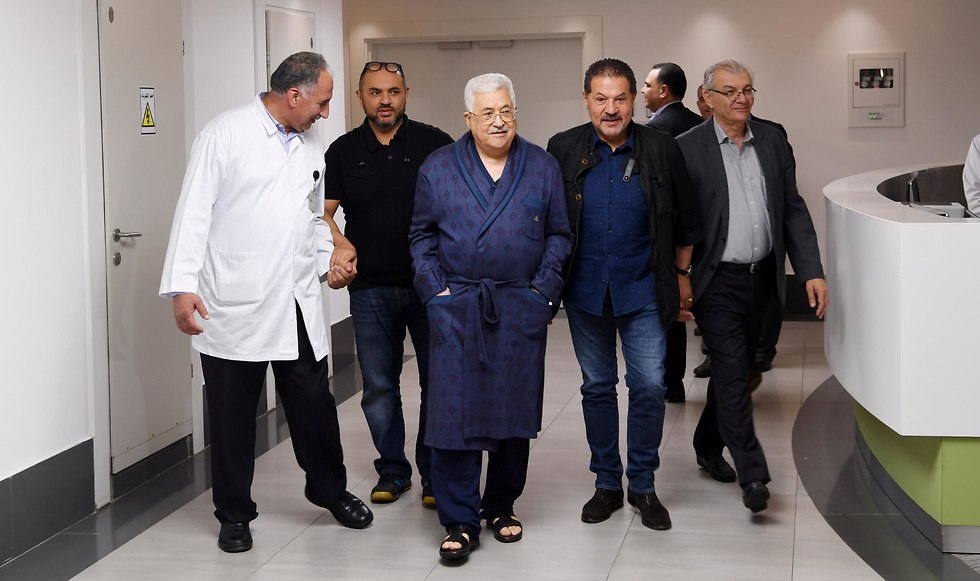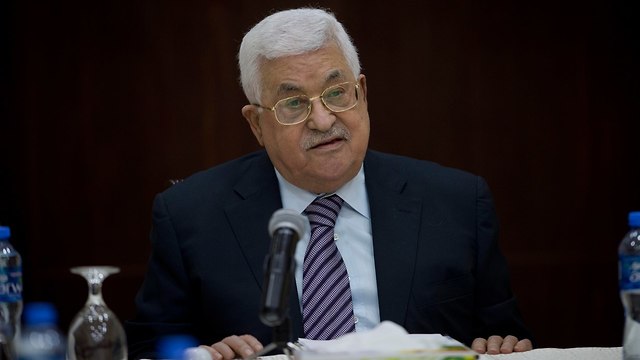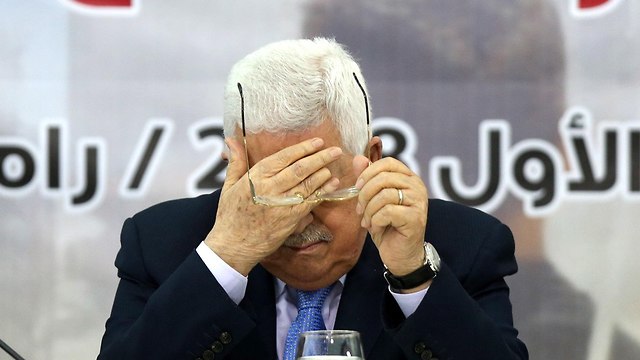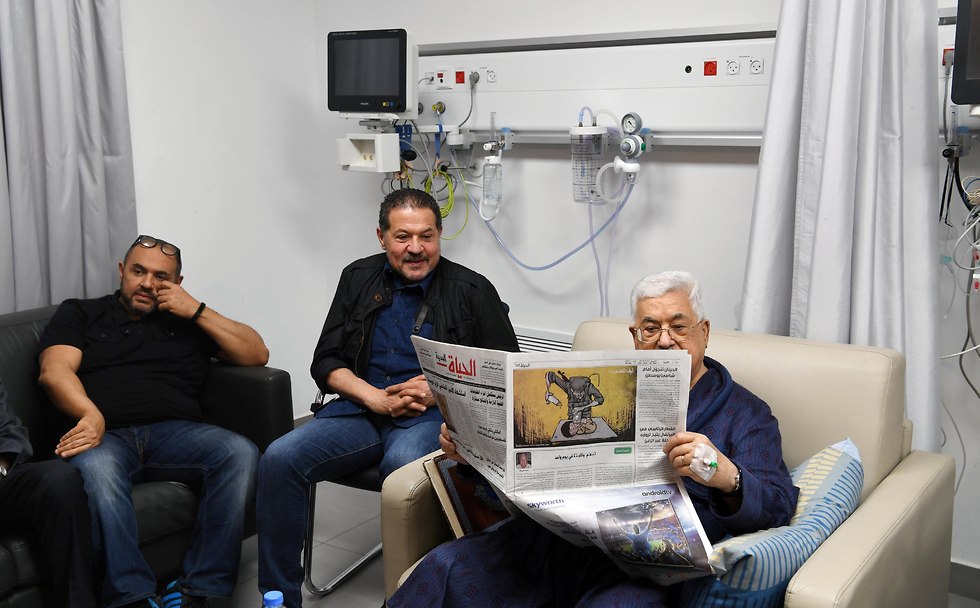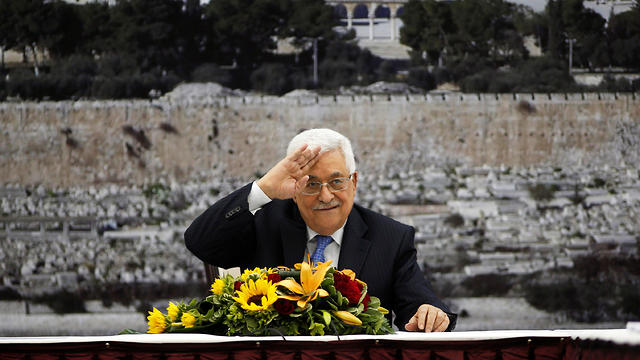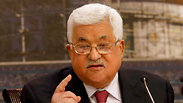
Who will succeed Mahmoud Abbas?
Mahmoud Abbas is almost 83, a heavy smoker, and a very sick man; although no one knows when he intends to retire, the battle over his many roles and titles is already heating up behind the scenes; these are the top contenders to replace him.
They also know his presence can become critical at any moment. Abbas is almost 83 years old and he is not a healthy person. He is a very heavy smoker, and some say he also suffers from heart problems, prostate cancer, and from a number of illnesses that in recent months have required undisclosed and public hospitalization in a medical center in Ramallah.
During his most recent public appearance at the United Nations, he coughed constantly and looked abnormally overweight, his face swollen, probably due to the use of steroids. His close aides would always say that he is "100 percent" and "in excellent condition," but the Israelis don't buy this and monitor him nonstop. They're not the only ones—the Americans, the Jordanians, and the Egyptians are all closely watching Abbas.
But even if everyone is fully aware of Abbas’s condition, nobody knows when he will actually retire. It could be in another week, another month or two. He himself has already announced that he will not run in the next elections, if and when they are held.
On the other hand, Abbas does not appear to be planning to resign from his positions as the president of the Palestinian Authority and of the Palestine Liberation Organization. He prefers to keep his cards close to his chest; as far as he is concerned, an announcement on a successor means the end of his career, and he will delay such a step as long as he can.
Behind the scenes, Israel is very involved in the process of finding Abbas's successor, having talks on the matter both with senior Palestinian officials and with the Arab states—Egypt, Saudi Arabia, Jordan and the United Arab Emirates. During their last meeting at the United Nations, for example, Prime Minister Benjamin Netanyahu and Egyptian President Abdel Fattah al-Sisi discussed at length the future of the Palestinian Authority post-Abbas.
In Arab media outlets—both in the West Bank and the Gaza Strip—the battle for Abbas's seat is already well underway. Journalists allow themselves to issue, albeit with some caution, explanations and answers to what will happen on the day after Abbas. There are dozens such articles, but they all have one thing in common: there are no quotes from Abbas's close circle. Either he's making sure they keep their mouths shut, or they themselves have decided that it was not the right time to talk, and certainly not openly.
So the big question right now is who will inherit Abbas. And also: Will the transfer of power be done in an orderly manner, or will it be accompanied by bloodshed and anarchy? Additionally, what will the choice mean for what remains of the peace process, the future of the Palestinian Authority and the future of the entire Middle East?
Standing out in the chaos
In this chaotic atmosphere—which Abbas possibly created intentionally—four possible candidates stand out. However, since the manner in which the successor will be chosen remains unclear, last minute surprises cannot be ruled out.
Right now it appears the number one contender is Mahmoud Aloul, Abbas’s deputy in Fatah, who was also the right-hand man of terrorist Khalil al-Wazir, also known as Abu Jihad.
Aloul is a Nablus native and also served as its governor. When he asked to return to the West Bank with Abbas and Yasser Arafat following the signing of the Oslo Accords, Israel opposed because of his involvement in terror attacks that cost the lives of IDF soldiers and his close ties to Abu Jihad. Eventually, an agreement was reached and he was allowed to return to Nablus. His son, Jihad, was killed in clashes with IDF soldiers in 2000 during the second intifada.
Abbas appointed him his deputy mainly because he doesn’t see him as a real competitor, and knows his popularity in the West Bank is very low.
Another candidate is Majid Faraj of Dheisheh, 56, the head of the Palestinian General Intelligence Service. He enjoys Israeli and American support. Rumours say he has already cut a power-sharing deal with Aloul for after Abbas is gone—but they have yet to agree on whole will get the top job.
The third candidate is Jibril Rajoub, 56, a member of the Fatah leadership and the former head of the Palestinian Preventive Security Force. Nowadays he serves as the head of the Palestinian Football Association. He realized that to win the support of the younger generation, he ought to focus on sports. His disadvantage is that he has many enemies in Jordan, Egypt and Israel, who will try their best to thwart his appointment.
The fourth, and most intriguing one of the candidates, is 57-year-old Mohammed Dahlan. He was born in a refugee camp in Gaza and grew up with Yahya Sinwar, the leader of Hamas in the Gaza Strip and one of the founders of its military wing. Dahlan is on bad terms with Abbas, who is waging a war against him: he banished him from Ramallah, confiscated his possessions and declared he refuses to speak to him.
Dahlan hired a lawyer, tried to sue, and claimed Abbas was making false accusations against him. Eventually, however, he gave up and moved to Abu Dhabi. He doesn’t stand much of chance of inheriting Abbas’s role, since he lives outside of the West Bank and might not be allowed back in—but many still wait and hope to see him take the lead.
Dahlan, on his part, has never given up. He visits Cairo every now and then to get updates, and his wife travels to Gaza with aid packages.
Besides these leading four candidates, there are other less possible contenders, who might surprisingly win the title once chaos is unleashed. One of them is Palestinian Prime Minister Rami Hamdallah, who recently survived an attempt on his life while he was visiting the Gaza Strip. Surprisingly, this did not influence his popularity in the West Bank. There is a chance he could be appointed to one of Abbas’s lesser important roles. Meanwhile, he sticks close to Abbas in an effort to increase his chances.
Marwan Barghouti, who is currently serving time in Israeli prison, is yet another option. He is still involved in Palestinian affairs and gets updates regularly. Abbas has been keeping his distance from him, hoping Barghouti is forgotten. But he remains a popular figure, with his portraits decorating the Mukataa's outer walls.
PLO secretary-general and chief negotiator Saeb Erekat is also in the running. His has the closest relationship with Abbas, and he is also the most educated of the candidates. However, he lacks a base of support.
If the choice was Israel’s, it would have probably favored Majid Faraj, with whom it is well acquainted after his many years of service as the head of Palestinian intelligence and his role as Israel’s contact to Abbas.
Not welcome in Gaza
In a way, Abbas represents the PA's founding generation. He was born in Safed, his family escaped to Lebanon in 1948, later settled in Egypt and then in Syria. He studied law in Damascus and chose an odd and outrageous subject: "The secret ties between Nazism and Zionism." This so-called research paper became a preposterous conspiracy theory about the Holocaust, and has been widely condemned.
Abbas was elected right after Arafat died in 2004. According to the letter of the law, he was supposed to retire in 2009 and hand over at least one of his positions to Aziz Duwaik from Hamas. This did not happen.
Abbas has been able to keep all of his titles to this day, with no elections (which were last held 13 years ago), no official appointment after his first term, and with no one knowing when, if at all, he plans to retire.
In all this uncertainty, one thing stands out—the fact that last year Abbas finally appointed a deputy, but only for his role as Fatah leader—Mahmoud Aloul.
Maj. Gen. (res.) Amos Yadlin, the head of Tel Aviv University's Institute for National Security Studies (INSS) and the former head of the IDF Military Intelligence Directorate, explains: "In Arafat’s days, it was obvious that Abbas will inherit the position. They were the two giants of the Palestinian struggle. Event though Arafat and Abbas had their internal differences, which we knew about, they bonded and understood each other.
"But today, there isn't a natural heir to replace Abbas. We in Israel don't know who will replace him, and I believe neither does the Palestinian side. This could quickly escalate into a power struggle."
Until Abbas retires, he will likely continue discussing the struggle against Trump and Netanyahu in Fattah circles and around the Arab world, which is patient with Abbas but is also warming up to Hamas's leadership. Egypt, Qatar, Turkey and even Israel—everybody is looking for a way to build facilities in Gaza that will improve the residents' daily lives, get them away from the borders and give them some kind of livelihood.
Abbas’s last speech at the UN was not screened in Gaza. The local channel screened an old film instead, and right after the speech Gazans took to the streets to protest against Abbas, carrying signs saying "Abbas doesn't represent me."
Hisham Muhammad, a young protester, told me: "We don’t care what Abbas has to say about peace. We are much more concerned with his threats to put more sanctions on Hamas. See, it concerns each and every one of us. We’re on the verge of going hungry, we can’t leave the strip, life here is unbearable and Abbas doesn’t care."
In late September, a delegation of Egyptian intelligence officials arrived in Gaza, headed by Ahmed Abdelkhaliq. Later, Hamas officials left for Cairo.
But the Egyptians have already reached the conclusion a reconciliation agreement between Fatah and Hamas cannot be reached. The two sides are neither capable or interested. These conclusions have also been delivered to Jerusalem and to security officials in Tel Aviv.
It is becoming clearer that all the involved parties outside the Palestinian territories have reached a conclusion that is being kept from the media: There won't be one Palestinian state, and there will be no unity between Gaza and the West Bank.
Egypt, Jordan, Saudi Arabia, Israel and the US—all have reached the same conclusion: the rift between Gaza and the West Bank is too deep to heal, and there is no way to bring the two together.
Hamas's official line speaks for itself: Abbas does not represent us, he can't speak at the UN on behalf of Gazans. For all we care, he can attack Israel and the US, it doesn't matter since we won't cooperate with him. And, if he insists on visiting the Gaza Strip, we will take him out.
But Abbas doesn't even dream of visiting the strip, especially after Prime Minister Rami Hamdallah was almost assassinated there. Hamas heads in Gaza have made it clear: "Abbas's people have nothing to look for here."
Hamas won't let Abbas's people into sensitive positions in the strip. "If they insist, they'll get jobs handing out salaries to their people in the strip. But let's see them trying to get here first," said a Hamas official.
Elias Zananiri is Vice-Chairman of the PLO Committee for Interaction with the Israeli Society. He knows Israel and Israelis very well, and thinks the Israeli left wing has disappeared. He speaks excellent Hebrew and appears in both Israeli and American media outlets.
"We can never know when Abbas will be done," said Zananiri. "If he retires before he sorts out the situation or appoints a deputy first, it would definitely be a hot potato for us. I don’t want to discuss it."
"Unfortunately, Abbas's power is limited today, because of Israel and because of the Americans. They don't want him and don't want a dialogue with him. They are sure they can dictate their plans," he added.
But Abbas has turned down all of the proposals made to him."That's because he can't trust President Trump and his people. I ask that you remember an important fact: There isn't a more moderate leader than Abbas. Most others will be more extreme. The problem is not what he will give, but what will Israel give," Zananiri said.
"But on your side, there's a competition who could be a more extreme leader. Think about it, tomorrow we'll have a different leader, not as moderate. The problem is that on the Israeli side, everybody is watching Abbas closely, but nobody wants to look in a way that sees peace. The Palestinians no longer see or hear a real active left wing in Israel,” he concluded.
Not with strangers
In Israel, the center and left support Abbas and try to make ties with his possible successors, but without much success so far.
"It's not the time," told me senior source in the PLO, who wished to remain anonymous. "Those hoping to get Abbas's position will not discuss it with strangers, certainly not with Israelis," he said.
But you will need Israel once Abbas is gone.
"Of course. We will mostly need for you to not interfere or cause riots. We will need any aid you would be willing to give us, and it will also work to your advantage."
Maj. Gen. (res.) Amos Gilad is also worried. "After Abbas, I see a strategic disaster. Unlike Arafat, who was a mega-terrorist, Abbas is strongly against terror and is the last partner for peace. He has become bitter, there's no other way to say it. He has possible successors, and he knows their worth, but none is really a strong contender," he said.
"I don't believe that Arab countries, especially Saudi Arabia, Egypt and Jordan, will dare deviate from the Saudi peace plan. Saudi and Egypt know of Hamas's desire to replace Abbas. That will be a disaster for Israel. It definitely bothers me when Hamas feels hopeful, and I think Israel has to prevent them from becoming dominant in the West Bank," Gilad continued.
"Abbas gives his successors the legitimacy not to cooperate with Israel. As long as he is in charge, the security coordination continues. A big part of it has to do with us, and that is the really important thing," he concluded.
In late September, Abbas filed a complaint to the International Criminal Court in The Hague against the Us, and mostly against President Trump, for moving the American embassy to Jerusalem.
A very senior Israeli official agreed to only say this: "Today, Abbas causes damage to the Palestinians and to Israel. He supports all those who are not interested in progress, and his behavior might well lead to chaos in Gaza—some say that's actually what he wants."
Regarding Abbas's successor, the official was willing to say that: "There is no central figure today that can replace Abbas. His role might also be divided into a few after the elections. I believe there will be elections, because times have changed for the Palestinians as well. Soon, someone will be given the role of the PLO leader instead of Abbas. After 60 days, perhaps more, they will go to the polls. Even though there are several contenders and some of them know how to do the job, it won't be simple. I foresee a lot of violence in the West Bank."










